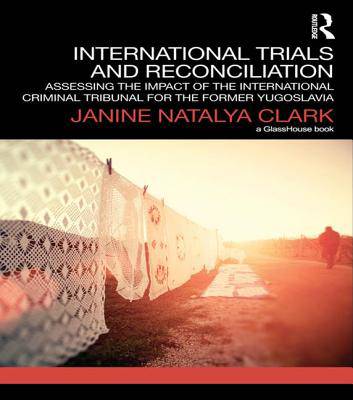
- Retrait gratuit dans votre magasin Club
- 7.000.000 titres dans notre catalogue
- Payer en toute sécurité
- Toujours un magasin près de chez vous
- Retrait gratuit dans votre magasin Club
- 7.000.0000 titres dans notre catalogue
- Payer en toute sécurité
- Toujours un magasin près de chez vous
International Trials and Reconciliation
Assessing the Impact of the International Criminal Tribunal for the Former Yugoslavia
Janine ClarkDescription
Transitional justice is a burgeoning field of scholarly inquiry. Yet while the transitional justice literature is replete with claims about the benefits of criminal trials, too often these claims lack an empirical basis and hence remain unproven. While there has been much discussion about whether criminal trials can aid reconciliation, the extent to which they actually do so in practice remains under-explored. This book investigates the relationship between criminal trials and reconciliation, through a particular focus on the International Criminal Tribunal for the former Yugoslavia (ICTY).
Using detailed empirical data - in the form of qualitative interviews and observations from five years of fieldwork - to assess and analyze the ICTY's impact on reconciliation in Bosnia-Hercegovina, Croatia and Kosovo, International Trials and Reconciliation: Assessing the Impact of the International Criminal Tribunal for the former Yugoslavia argues that reconciliation is not a realistic aim for a criminal court. They are, Janine Clark argues, only one part of a rich tapestry of justice, which must also include non-retributive transitional justice processes and mechanisms.
Challenging many of the common yet untested assumptions about the benefits of criminal trials, this innovative and extremely timely monograph will be invaluable for those with interests in the theory and practice of transitional justice.
Spécifications
Parties prenantes
- Auteur(s) :
- Editeur:
Contenu
- Nombre de pages :
- 250
- Langue:
- Anglais
- Collection :
Caractéristiques
- EAN:
- 9781138999206
- Date de parution :
- 10-09-15
- Format:
- Livre broché
- Format numérique:
- Trade paperback (VS)
- Dimensions :
- 156 mm x 234 mm
- Poids :
- 381 g

Les avis
Nous publions uniquement les avis qui respectent les conditions requises. Consultez nos conditions pour les avis.






